Kamala Sohonie Biography: A Pioneer in Indian Science
In the realm of Indian science, Kamala Sohonie stands as a remarkable pioneer who made significant contributions to the field.
Born on March 6, 1912, in Bombay (now Mumbai), India, Sohonie was a brilliant scientist and biochemist.
Her groundbreaking work in enzymology, particularly her exploration of insulin, has left an unforgettable mark on the scientific community.

Early Life and Education
Kamala Sohonie’s journey into the world of science began with her early education in Mumbai. She bettered in her studies and showed a keen interest in the field of chemistry.
In 1932, she earned her Bachelor of Science degree from the University of Bombay, where she outgunned the class.
Pursuit of Higher Education
Driven by her passion for scientific research, Sohonie set her sights on pursuing higher education.
Embarking on a transformative trip in 1933, she ventured across abysses to the outstanding land of England, driven by an inextinguishable thirst for knowledge.
Her destination the hallowed halls of the prestigious University of Cambridge, where the witching
realm of biochemistry awaited her eager disquisition.
It was there that she encountered the renowned biochemist Frederick Gowland Hopkins, who became her mentor and played a pivotal role in shaping her scientific career.
Under Hopkins’ guidance, Sohonie embarked on her research journey, focusing on the study of enzymes and their role in metabolic processes.
She worked diligently and displayed exceptional talent, earning her Ph.D. in Biochemistry in 1939. Sohonie’s doctoral research focused on the enzymatic breakdown of carbohydrates, which laid the foundation for her future contributions in the field of enzymology.
Contributions to Enzymology
After completing her Ph.D., Kamala Sohonie returned to India with a burning desire to advance scientific knowledge in her homeland.
She joined the Indian Institute of Science in Bangalore, where she conducted groundbreaking research on insulin.
Sohonie’s work focused on the purification and characterization of insulin, a vital hormone that regulates blood sugar levels.
With unwavering determination and relentless pursuit, her research unfurled like a tapestry of enlightenment, unraveling the intricate secrets concealed within the realms of biochemistry. I
n her noble quest, she delved deep into the labyrinthine intricacies of insulin, unearthing precious insights that would ignite a beacon of hope for those afflicted by diabetes. Her groundbreaking discoveries laid a solid foundation,
propelling humanity towards a future adorned with enhanced therapies and brighter prospects in the realm of diabetic treatments. Sohonie’s contributions to enzymology and her in-depth understanding of insulin’s properties played a pivotal role in advancing the field of biochemistry in India.
Academic Career and Recognition
In addition to her research endeavors, Sohonie was also deeply involved in academia. She held various teaching positions and served as the Head of the Biochemistry Department at the Indian Institute of Science.
Sohonie’s passion for education and her dedication to nurturing young scientific minds helped shape the future of biochemistry in India.
Sohonie’s exemplary work earned her recognition and accolades within the scientific community. She received the prestigious Shanti Swarup Bhatnagar Prize for her outstanding contributions to the field of biochemistry in 1957.
Sohonie’s research papers were widely published in esteemed scientific journals, solidifying her reputation as a leading scientist in India.
Legacy and Impact
Kamala Sohonie’s contributions to Indian science and her pioneering research in enzymology continue to have a lasting impact. Her work laid the foundation for further advancements in the field and inspired generations of young scientists to explore the intricate workings of enzymes.
Sohonie’s determination and unwavering commitment to her scientific pursuits serve as an inspiration to aspiring researchers. She broke barriers and shattered stereotypes, proving that women have an essential role to play in the scientific community.
Conclusion
Kamala Sohonie’s biography is a testament to her remarkable achievements and her unwavering dedication to scientific exploration. As a pioneering biochemist, her research in enzyme




